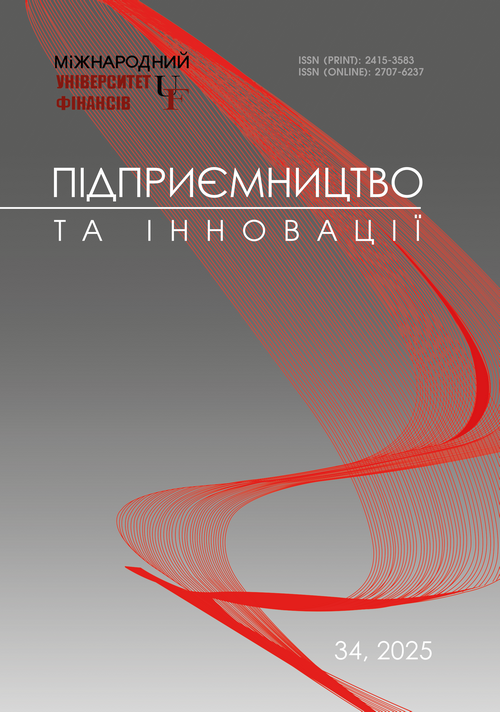DIGITAL TRANSFORMATION OF LOGISTICS IN FOREIGN ECONOMIC ACTIVITIES: CHALLENGES AND PROSPECTS
Abstract
The article outlines that the digital transformation of logistics in foreign economic activity (FEA) is a key aspect that contributes to increasing the efficiency of international supplies, reducing risks and optimizing costs. The introduction of innovative technologies, such as artificial intelligence, the Internet of Things (IoT), blockchain and big data, allows you to create transparent, flexible and high-performance logistics systems that significantly improve the management of global supply chains and customs procedures. Thanks to these technologies, it is possible to automate supply chain management processes, forecast demand, identify potential risks in time and reduce the impact of unforeseen situations. The integration of smart transport systems and automated warehouses contributes to a significant reduction in the costs of logistics operations, improving efficiency and increasing the flexibility of supply management. It was determined that the digitalization of logistics is accompanied by a number of challenges, one of the main of which is the need for significant investments in infrastructure modernization and the introduction of new technologies, as well as in ensuring cybersecurity for data protection; it was demonstrated that an important aspect is the need to unify data exchange standards to ensure seamless integration between different links in supply chains. It was noted that in order to increase the competitiveness of enterprises, it is important to develop strategies for integrating modern digital technologies into logistics processes, creating conditions for cooperation between the public and private sectors, which will contribute to the development of an innovative logistics ecosystem. It was determined that for Ukraine, important aspects of the development of international logistics are overcoming existing barriers, such as unpredictable risks associated with changing climate conditions, the lack of a single register of vehicles, increasing transport costs and economic difficulties. The importance of adapting national legislation to international standards, improving infrastructure and expanding transit cargo flows was emphasized. At the same time, the development of investment programs for the modernization of rolling stock and logistics systems, as well as the introduction of modern solutions to reduce the environmental impact of transport are necessary steps to improve the environmental situation. It was emphasized that innovative digital technologies allow creating high-quality services for international partners, reducing the time to fulfill contractual obligations and increasing the efficiency of work at all stages of the supply chain; the digital transformation of logistics is becoming an important factor in increasing the competitiveness of enterprises that are able to quickly adapt to changes in the global market; the introduction of these technologies helps to strengthen the positions of enterprises in the international arena, reduce operating costs and ensure the effective functioning of international supply chains.
References
Johannes Kern. Digital transformation of logistics: an overview of technologies and the status of their implementation. Digital transformation of logistics. 2021. Рр. 361–403. URL: https://www.researchgate.net/publication/350570671_The_Digital_Transformation_of_Logistics_A_Review_About_Technologies_and_their_Implementation_Status
Скіцько В. І. Логістика в індустрії 4.0. Економіка та держава. 2016. № 4. С. 28–33. URL: http://www.economy.in.ua/pdf/4_2016/7.pdf
Vladimir Ilin, Dragan Simiс, Nenad Sauliс. Logistics industry 4.0: challenges and opportunities. 4th Logistics International Conference. Belgrade, Serbia, May 23-25. 2019. Рр. 293–301. URL: https://logic.sf.bg.ac.rs/wp-content/uploads/LOGIC_2019_ID_33.pdf
Лісіца В.В., Михайленко О.М., Ротенберг О.В. Цифрові ланцюги поставок: технології, тенденції та напрями розвитку. Причорноморські економічні студії. 2023. № 81. С. 99–106. URL: http://bses.in.ua/journals/2023/81_2023/19.pdf
Гуржій Н., Гавран В., Сапотніцька Н. Цифрові технології та їхній вплив на управління логістичними процесами підприємств. Економіка та суспільство. 2023. № 55. URL: https://doi.org/10.32782/2524-0072/2023-55-20
Гришко В. Управління логістичними операціями зовнішньоекономічної діяльності підприємства. Економіка та суспільство, 2022. № 35. URL: https://doi.org/10.32782/2524-0072/2022-35-54
Авраменко О.В. Міжнародна логістика: місце України на світовому ринку транспортно-логістичних послуг. Ефективна економіка. 2021. № 9. URL: http://www.economy.nayka.com.ua/pdf/9_2021/72.pdf
Гришко В.В., Болдирєва Л.М. Управління транспортною логістикою в умовах євроінтеграції. Економіка і регіон. 2016. № 1 (56). С. 31–37.
Johannes Kern. Digital transformation of logistics: an overview of technologies and the status of their implementation. Digital transformation of logistics. 2021. Рр. 361–403. Available at: https://www.researchgate.net/publication/350570671_The_Digital_Transformation_of_Logistics_A_Review_About_Technologies_and_their_Implementation_Status
Skitsko V. I. (2016) Lohistyka v industriyi 4.0 [Logistics in Industry 4.0]. Ekonomika ta derzhava – Economy and State, no. 4, pp. 28–33. Available at: http://www.economy.in.ua/pdf/4_2016/7.pdf
Ilin V., Simiс D., Sauliс N. (2019) Logistics industry 4.0: challenges and opportunities. 4th Logistics International Conference (Belgrade, Serbia, May 23-25, 2019), pp. 293–301. Available at: https://logic.sf.bg.ac.rs/wp-content/uploads/LOGIC_2019_ID_33.pdf
Lisytsia V. V., Mykhailenko O. M., Rotenberg O. V. (2023) Tsyfrovi lantsiuhy postavok: tekhnolohiyi, tendentsiyi ta napriamy rozvytku [Digital Supply Chains: Technologies, Trends, and Development Directions]. Prychornomorski ekonomichni studii – Black Sea Economic Studies, no. 81, pp. 99–106. Available at: http://bses.in.ua/journals/2023/81_2023/19.pdf
Hurzhii N., Havran V., Sapotnytska N. (2023) Tsyfrovi tekhnolohiyi ta yikhniy vplyv na upravlinnia lohistychnymy protsesamy pidpryiemstv [Digital Technologies and Their Impact on Enterprise Logistics Management]. Ekonomika ta suspilstvo – Economy and Society, no. 55. DOI: https://doi.org/10.32782/2524-0072/2023-55-20
Hryshko V. (2022) Upravlinnia lohistychnymy operatsiiamy zovnishnoekonomichnoi diialnosti pidpryiemstva [Management of Logistics Operations in the Foreign Economic Activity of an Enterprise]. Ekonomika ta suspilstvo – Economy and Society, no. 35. DOI: https://doi.org/10.32782/2524-0072/2022-35-54
Avramenko O. V. (2021) Mizhnarodna lohistyka: mistse Ukrainy na svitovomu rynku transportno-lohistychnykh posluh [International Logistics: Ukraine's Position in the Global Market of Transport and Logistics Services]. Efektyvna ekonomika – Efficient Economy, no. 9. Available at: http://www.economy.nayka.com.ua/pdf/9_2021/72.pdf
Hryshko V. V., Boldyrieva L. M. (2016) Upravlinnia transportnoiu lohistykoiu v umovakh yevrointehratsii [Transport Logistics Management in the Context of European Integration]. Ekonomika i rehion – Economy and Region, vol. 1(56), pp. 31–37.



